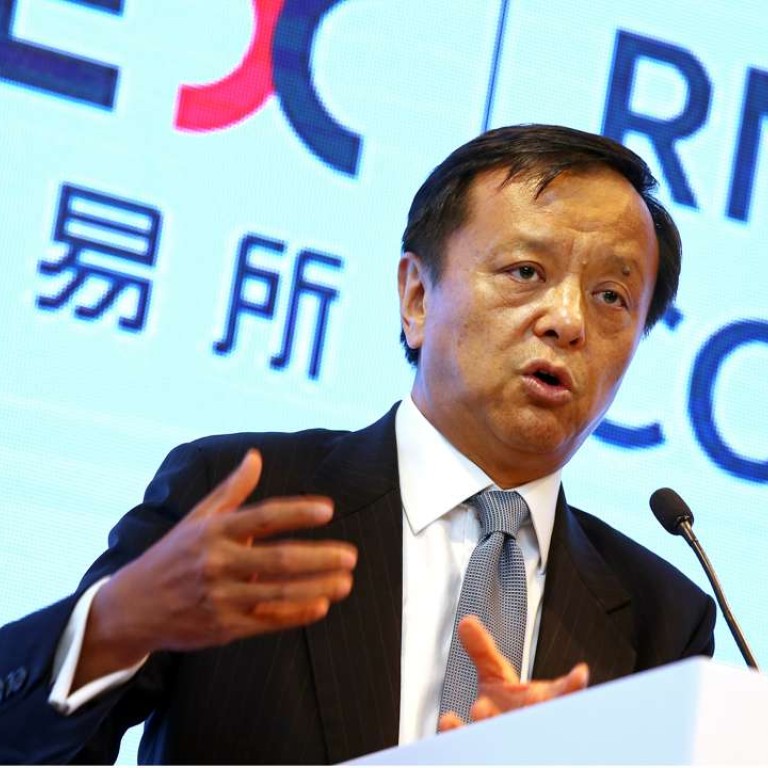
Hong Kong’s struggling debt market puts a damper on hopes for bond connect scheme
A weakened yuan and rising interest rates have dragged yuan-denominated bonds issued in Hong Kong to a record low, raising concerns whether the current environment is appropriate to push ahead with the bond connect programme this year.
Hong Kong Exchanges and Clearing chief executive Charles Li Xiaojia said in January that the launch of the bond connect plan, linking the debt markets in Hong Kong and mainland China, would be the next major cross-border trading scheme after the stock links with Shanghai and Shenzhen.
Hong Kong and Shanghai first launched the stock connect scheme in 2014 to allow international investors to trade Shanghai A shares through Hong Kong-based brokers while mainlanders can trade Hong Kong stocks through mainland stockbrokers. A similar scheme between Hong Kong and Shenzhen was launched in December 2016.
Premier Li Keqiang last month pledged to set up a bond connect scheme between Hong Kong and the mainland this year in a bid to allow overseas capital to access the mainland’s debt market.
The high-level endorsement shows the bond link was inching closer to an official launch, yet a reassessment might be in order, given the shifting market conditions.
Issuance of Hong Kong dollar-denominated bonds fell 56 per cent year on year in the first quarter to US$3.83 billion, reflecting the worst first quarter since 2014.
Yuan-denominated bonds, or dim sum bonds, issued in Hong Kong were down 87 per cent in the quarter to US$434.9 million, the lowest of any first quarter since the beginnings of the market in 2011.

Others, however, supported the government in pressing ahead with the scheme.
“As bonds are going through tough times lately, I don’t think a short-term approach should be the determining factor in the timing of rolling out a large-scale bond connect offering,” said Brett McGonegal, chief executive of Capital Link International.
“Product offering is vital in allowing foreigners to have a breadth of products to allow diversification of investment. I would think government and corporate bonds will make up the lion’s share of the market, and special drawing rights and infrastructure bonds will play a huge role in scaling the product offering.”
The potential scheme will benefit retail investors as they can only invest through bond funds while there is currently no means for retail investors to buy specific individual bonds, according to Bruno Lee, head of partnership, product and platform development, wealth and asset management, Asia of Manulife Asset Management.

“Global corporates will more likely look to raise capital from Hong Kong’s debt capital markets, tapping into the wider investor base of mainland China. From a capital market development’s perspective, this would potentially enhance the competitiveness and significance of Hong Kong’s bond market, similar to the case of a euro bond market,” Lee said.
Eric Liu, portfolio manager of fixed income at Manulife Asset Management, said the People’s Bank of China’s monetary stance was neutral, which was supportive for domestic bond markets, unlike the Federal Reserve’s clear monetary tightening stance.
“China is still one of the highest-yielding bond markets globally with the yield of its 10-year Chinese government bonds standing at 3.28 per cent, while that of the 10-year US Treasury is 2.39 per cent, the 10-year German Bunds 0.32 per cent and the 10-year Japanese government bonds 0.06 per cent,” Liu said.
Jack Siu, investment strategist for Asia-Pacific at Credit Suisse, said that with the anticipation of the launch of the bond connect scheme, the market might begin to price in the potential for related exchanges to earn additional fee income from future bond flows.
“In terms of participation, I believe we are likely to see institutional interest leading before retail investors warm up to this asset class,” he said.
Looking ahead, Siu said the Chinese bond markets had seen a resilient year to date with ample demand for both the offshore and onshore markets.
“We believe there is room for yields to rise as the government intends to deleverage the market,” Siu said.

